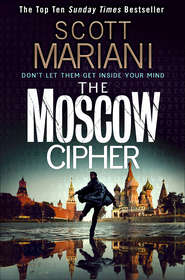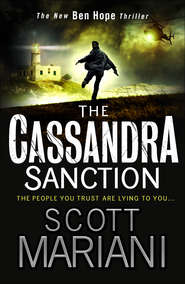По всем вопросам обращайтесь на: info@litportal.ru
(©) 2003-2024.
✖
Ben Hope
Автор
Год написания книги
2019
Настройки чтения
Размер шрифта
Высота строк
Поля
‘What do you reckon, boss?’ Sai, at his shoulder, was gazing at the screen of the iPhone.
‘I think we might have found it, boys,’ Kabir replied. His voice was calm but his heart felt ready to leap out of his chest. He took a couple of deep breaths, then started leading the way down the rocky slope towards the river valley. He ran five miles every day and was as nimble as a mountain goat over the rough terrain. Sai was markedly less so, being overly partial to calorie-laden Delhi street food, and Manish was a city kid too used to level pavements. Slipping and stumbling and causing little rock slides under their feet, they manfully followed their leader down the hillside. By the time they reached the bottom, Kabir was already tracking along the river bed, walking slowly and scanning left and right as though searching for clues.
It was hard to believe that such an arid and inhospitable area could have once been a major centre of one of the largest and most advanced cultures of the ancient world. But that was exactly what it was.
To say that the lost Harappan or Indus Valley Civilisation was Kabir’s overriding interest in life would have been a crashing understatement. Long, long ago, over a stretch of time spanning one and a half thousand years during the second and third millennia BCE, the culture had thrived throughout the north-western parts of South Asia. Their empire had been larger than that of Mesopotamia; greater even than that of ancient Egypt or China. It had covered a vast area comprising parts of what were today Afghanistan, Pakistan and north-west India. At its peak, it was thought to support a population of five million inhabitants, which by ancient standards was enormous.
And yet, virtually nothing was known about these people. Nobody even knew what they called themselves, let alone how they organised their society. The most baffling enigma of all was the question of what had finally caused their whole civilisation to crumble and disappear in an astonishingly short time.
For years, it had been widely assumed in the archaeology world that the main centres of the Indus Valley Civilisation had been the excavated cities at Harappa and Mohenjo-Daro, both in Pakistan. This had been a major frustration for archaeologists from India, since tensions between the two nations made it hard for them to travel freely in their neighbouring country. More recently, important finds made at Rakhigarhi in India’s Haryana region had radically changed that view. Many historians and archaeologists now believed that the sheer size of the site excavated at Rakhigarhi, and the wealth of incredible, priceless artefacts found under its dusty, rocky ground, pointed to its having once been the capital of the entire civilisation. If that was true, as Kabir fervently wished it was, then it might offer scholars the opportunity to finally start figuring out the secrets of the ancient lost culture.
Exactly what he hoped to find here, all this way from the main Rakhigarhi site, Kabir couldn’t say for certain. All his hopes were pinned on the remarkable journals, which described ‘a vast treasure most precious to all men on earth’. The man who’d penned those words had been one of the most important explorers of his generation. If his claims were right, Kabir could be standing, literally, on top of the biggest and most valuable archaeological find ever.
Treasure. The excitement he felt at the sound of that word took his breath away.
But even once he found it, getting it out of the ground would be no easy task. Kabir had already made some private, tentative enquiries among his contacts in the Indian government. They were unlikely to agree to fund a new excavation project, but as long as they agreed in principle, Kabir was more than willing to pay for it out of his own pocket. His very own private dig, fully under his own supervision. He calculated that to bring in sufficient manpower and equipment to get things rolling would cost him at least a hundred million rupees, equivalent to about one and a half million American dollars.
Kabir didn’t blink at those figures. The benefits of being born into wealth.
Manish and Sai caught up with him and the three of them walked on, following the river bed. Each man was silent, gazing at the rocky ground underfoot and imagining what wonders might be hidden below. It was a heady feeling. Finally, Manish said, ‘Wow, boss, you really think it’s here somewhere?’
Kabir said nothing. He was gazing into the distance as he walked. His step slowed, then slowed again, and he halted, his eyes still fixed on some faraway point on the rocky horizon to the south-west of the river valley. He frowned. Looked again at the iPhone screen, then studied the horizon once more. Manish and Sai exchanged glances, wondering what the professor had seen. Manish asked, ‘What’s up?’
Kabir remained quiet for a moment longer, then pointed in the direction he’d been gazing. ‘See that range of hills over there?’
Manish and Sai looked. ‘Yeah, I see it,’ Sai replied. Manish asked, ‘What about it?’
Kabir lowered his pointing finger and tapped the iPhone screen with it. He frowned harder. ‘It’s not here.’
Manish shrugged and said, ‘So? Everything else is the same. We must be in the right place.’
Kabir shook his head. ‘Those hills have been there since prehistoric times, Manish. They didn’t just sprout up in the last two hundred years. Trafford would have drawn them on the map, like he drew everything else. He didn’t. Something’s wrong.’ He was suddenly anxious. He bit his lip and compared the map and the landscape once more.
‘But the coordinates led us here,’ Sai said. ‘They must be right.’
Kabir sighed. ‘The coordinates are based on one guy’s skill with compass and stars, long before we had pinpoint-accurate navigational technology. There’s little margin for error. One tiny slip on Trafford’s part and the GPS could take us half a mile off course, or more.’
‘So what are you saying?’ Manish asked, staring at him.
‘I’m saying there’s a disparity between the map and this location that I hadn’t noticed before.’
Sai said, ‘In other words, we’re in the wrong bloody place.’
Manish was about to say something when he suddenly froze. ‘Hear that?’
Sai said, ‘What?’
Now Kabir heard it, too, and turned to look in the direction of the sound.
The approaching vehicle appeared on the ridge above the river valley, some ninety or a hundred yards to the west, the direction of the parked helicopter. Kabir instinctively didn’t like the look of it. As he watched, it tipped over the edge of the slope and started bouncing and pattering its way down the hillside towards them, throwing up a dust plume in its wake. It was moving fast. Some kind of rugged four-wheel-drive, like the Nissan Jonga jeeps the Indian Army used to use.
‘Who are they, boss?’ Sai asked apprehensively.
‘No idea. But I think we’re about to find out.’
The jeep reached the bottom of the hillside and kept coming straight towards them, lurching and dipping over the rubble. Then it stopped, still a long way off. The terrain on the approach to the river bed was too rough even for an off-roader. The doors opened. Two men climbed out of the front. Three more climbed out of the back. All of them were clutching automatic rifles, but they definitely weren’t the Indian Army.
‘Dacoits!’ Manish yelped.
Sai’s jaw dropped open. An expression of pure horror plastered his face. ‘Oh, shit.’
Dacoits were bandits, of which there were many gangs across north-west India. They were growing bolder each year, despite the increasingly militarised and notoriously brutal efforts of the police to round them all up. Kabir had read a few days earlier that an armed gang of them had robbed a bank in Haryana. Their sudden appearance was the last thing he’d have expected out here, in the middle of the wilderness. But all the same he now cursed himself for having left his self-defence pistol at home in Delhi. His mouth went dry.
‘They must have seen us landing,’ Sai said in a hoarse, panicky whisper. ‘What are we going to do, boss?’ Both he and Manish were looking to their professor as though he could magically get them out of this.
The five men were striding purposefully towards them. Spreading out now. Raising their weapons. Taking aim. Looking like they meant it.
‘Run,’ Kabir said. ‘Just run!’
And then the gunshots began to crack out across the valley.
Chapter 1 (#u0b94581c-41fb-5b71-80f8-260a6db698c7)
Three weeks later
The walls of the single-storey house were several feet thick and extremely well insulated, solidly reinforced on the outside and clad on the inside with thick, sturdy plywood. The house featured several rooms and offered spacious facilities well suited to its purpose.
But it wasn’t a dwelling in which anybody would have wanted to live. Not even the mice that inhabited the remote compound’s various other sheds and outbuildings would have been tempted to make their nests in its walls. Not considering the activities that went on there.
Yet, the building wasn’t empty that autumn afternoon. At the end of a narrow corridor was the main room; and in the middle of that room sat a woman on a wooden chair. She wasn’t moving. Her wrists and ankles were lashed tight and her head hung towards her knees, so that her straggly blond hair covered her face. To her right, a kidnapper in torn jeans reclined on a tattered sofa with a shotgun cradled across his lap. To her left, another of the woman’s captors stood in a corner.
Nobody spoke. As though waiting for something to happen.
The waiting didn’t go on long.
The stunning boom of an explosion shattered the silence and shook the building. Heavy footsteps pounded up the corridor towards the main room. Then its door crashed violently inwards and two men burst inside. One man was slightly taller than the other, but otherwise they were indistinguishable in appearance. They were dressed from head to foot in black, bulked out by their body armour and tactical vests, and their faces were hidden behind masks and goggles. Each carried a semiautomatic pistol, same make, model and calibre, both weapons drawn from their tactical holsters, loaded and ready for action.
The two-man assault team moved with blinding speed as they invaded the room. They ignored the hostage for the moment. Her safety was their priority, which meant dealing with her captors quickly and efficiently before either one could harm her. The taller man unhesitatingly thrust out his weapon to aim at the kidnapper in the corner and engaged him with a double-tap to the chest and a third bullet to the head, the three snapping gunshots coming so fast that they sounded like a burst from a machine gun. No human being alive could have responded, or even flinched, in time to avoid being fatally shot.
The other man in black moved across the room to engage the kidnapper on the sofa. Shouting DROP THE WEAPON DROP THE WEAPON DROP THE WEAPON!
The kidnapper made no move to toss the shotgun. The second assault shooter went to engage him. His finger was on the trigger. Then the room suddenly lit up with a blinding white flash and an explosion twice as loud as the munitions they’d used to breach the door blew the shooter off his feet. He sprawled on his back, unharmed but momentarily stunned. His unfired pistol went sliding across the floor.
The room was full of acrid smoke. The kidnapper in the corner had slumped to the floor, but neither the bound hostage nor her captor on the sofa had moved at all. That was because they were the latest type of life-size, high-density foam 3D humanoid targets that were being used for live-fire hostage rescue and combat training simulations here at the Le Val Tactical Training Centre in Normandy, France. The ‘kidnappers’ had already been shot more full of holes than French Gruyère in the course of a hundred similar entry drills performed inside the killing house. So had the hostage, more than her fair share. But they’d survive to go through the whole experience another day, and many more.
The taller of the two assault shooters made his weapon safe and clipped it back into its holster, then pulled off his mask and goggles and brushed back the thick blond lock that fell across his brow. His haircut definitely wouldn’t have passed muster, back in his SAS days. He walked over to his colleague, who was still trying to scramble to his feet.
Ben Hope held out a gloved hand to help him up. He said, ‘Congratulations. You’re dead, your team are dead, your hostage is dead. Let’s review and start over.’











